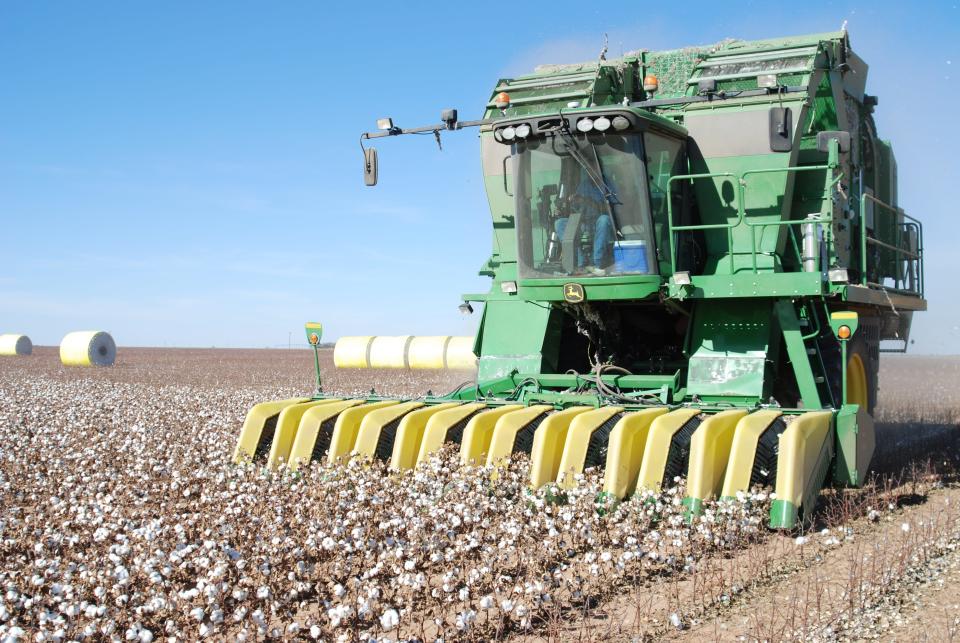Lubbock ag leaders, experts share optimism at annual chamber luncheon
One truck after another drove up the sloped driveway of the FiberMax Discovery Center on Tuesday morning as they headed to celebrate the region's top industry: agriculture.
Hundreds gathered inside the facility that was lined with antique tractors and overlooked Lubbock's skyline on National Ag. Day to attend the Lubbock Chamber of Commerce's Salute to Ag. Luncheon.
Every organization from Sorghum Checkoff and Plains Cotton Growers to about a dozen faculty from Texas Tech and several farmers and ranchers sat in the audience, there to recognize the important role this industry has within our city.
And among the notable names in the room: Texas Tech President Lawrence Schovanec, Lubbock County Judge Curtis Parrish, representatives from the offices of Sen. Ted Cruz and Sen. John Cornyn and Dean Clint Krehbiel of the Gordon W. Davis College of Agricultural Sciences and Natural Resources at Texas Tech University, who served as the event's keynote speaker.
As Jeremy Barbee initiated the event with an invocation, all stood in prayer along with him, thanking God for another bountiful year to serve the people of "West Texas and the entire world."
"Lord, bless our farmers, producers and everyone connected to the ag. industry," Barbee said. "And we ask that you bring us rain."
Krehbiel, who shared the story of his arduous journey to Lubbock decades ago, said the luncheon was more than just a salute to the industry but also to recognize those that have held strong and committed to carrying the industry throughout good and bad harvests.
He paid special acknowledgements to Tech's Davis College, which he described as a leader in "supporting our great farmers and ranchers."
"(We're here) really thinking about the industry as a whole and how academia supports the industry: agriculture, farmers, ranchers and allied industries in this region," Krehbiel said. "This is a billion-dollar economic piece of the state of Texas — so a very influential reason from the West Texas to the High Plains relative to the overall population of agriculture."
Despite seeing one of the worst harvests across all crops last year, Krehbiel holds onto hope that coming years will be more fruitful.

Amid record-high temperatures and persistent dry periods, sunflowers were the one major field crop of the High Plains performed better in 2022 than the year prior, while corn, peanuts, sorghum, soybean and wheat all saw a significant decrease in production from 2021, the Lubbock Avalanche-Journal previously reported.
Meanwhile, Texas cotton headed into the growing season with its highest planted area since 1954, but yielded record abandonment levels and the lowest-ever cotton harvest the state has seen. And hay also recorded its lowest yield in a decade, leading to the smallest amount of hay on hand that our country has offered since the U.S Department of Agriculture began tracking roughage in 1973.
Extreme temperatures and long-lasting heatwaves also resulted in the biggest cattle slaughter in a decade, accounting for about 80,000 head of cattle per week this summer, according to the Texas A&M AgriLife Extension agency.
As experts predict more frequent and extreme droughts that could further deplete the Ogallala Aquifer — our community's main water source for irrigation and livestock — and provoking more frequent and powerful haboobs, Krehbiel said the Davis College has implemented many initiatives through the Davis College Water Center that should help produce more prosperous crops.
"Obviously water, especially in this region, is going to be critical in terms of management," Krehbiel said. "It's the most important natural resource, and we're looking at a lot of different aspects to that very question."
The university announced in a news release on March 13 that Austin-based Tito's Handmade Vodka, through the company's Love philanthropic branch, has become the leading supporter of Texas Tech's Davis College Water Center through a donation of $1.2 million. With research, outreach, and education, the center helps to address local and global water issues in relation to agriculture and the environment.
He added that, as modern-day challenges approach our region and impact the agriculture industry, and as the city of Lubbock shifts to a more diverse population, the college is adjusting its curriculum to support these matters.
"Our students are changing, and we're getting a lot more students from urban backgrounds, and they come in with a completely different perspective," Krehbiel said. "So, we're taking the opportunity to interact with them and starting with who they are. Then we discuss the topics around these challenging issues and grand challenges.
"All things related to agriculture and how society perceives what we do in production agriculture are very important conversations we're having in our classrooms," he concluded.
This article originally appeared on Lubbock Avalanche-Journal: Lubbock ag leaders, experts share optimism at annual chamber luncheon
